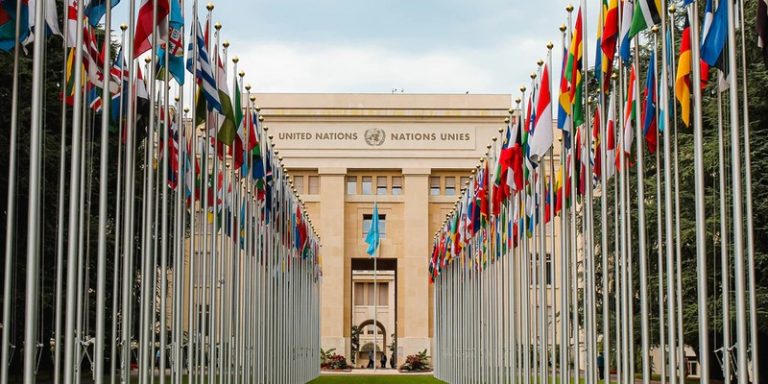
In the process of achieving the goals of Agenda 2030, the UN’s 2030 Agenda for Sustainable Development, science, technology and innovation are taking on a huge role. The 6th multi-stakeholder collaboration forum focusing on these key areas calls for harnessing their potential for the benefit of all. The message sent by this event also included a reference to the Covid-19 pandemic, which according to the UN, has never revealed the importance of science and technology for our well-being and survival.
The 6th Multi-Stakeholder Collaboration Forum on Science, Technology and Innovation began on Tuesday, May 4, 2021 and continued on Wednesday, May 5. On the first day, three sessions were held around three different topics:
- Science, technology and innovation – lessons learned from the Covid-19 pandemic
- Science, technology and innovation policies and initiatives for achieving the sustainable development goals – best practices and lessons learned
- Effective Pathways to the SDGs: Science, Technology and Information for Ending Poverty and Hunger, Improving Human Well-Being and Building Resilience
In his message to the Forum’s participants, UN Secretary-General António Guterres wished to highlight the use of science, technology and innovation in the context of the Covid-19 pandemic and the need for greater global cooperation on the subject in order to achieve the Agenda 2030 goals.
An analysis of the use of technology and science in the context of the pandemic
During this first session, lessons learned from the Covid-19 pandemic were discussed. Vaughan Turekian, US Academy of Sciences and moderator of the debate, asked how the events that took place during the pandemic could be used in the future.
Several experts, institutions and UN member states spoke on the issue:
- Nisia Veronica Trindale Lima, President of the Oswaldo Cruz Foundation in Brazil, wants science and technology to be used to fight inequality. This desire stems from the observation that she has made about a rebound in inequalities due to the health context.
- Dr. Dina Dellyana, coordinator of the Global Center of Excellence and International Cooperation for creative Economy, has noticed that many people do not have access to digital technologies. She and her institution want to be a pioneer in training the most vulnerable in data management or digital marketing.
- Finland mentioned the fact that during a pandemic like Covid-19, the combination of a multitude of knowledge is essential. Hence the importance, according to Finland, of pooling all the knowledge produced by countries in different fields related to science, technology and innovation.
- In parallel to these statements, UNESCO has claimed to have been trying to accomplish this task for over 75 years. It has recommended the deployment of many long-term investments in scientific disciplines and the pooling of resources for countries that cannot make them.
Policies and initiatives in scientific disciplines
As in the first session, many personalities spoke on the issue of institutional and policy involvement in scientific disciplines. This debate was reserved for ministers from UN member countries.
Liu Zhenmin, Under-Secretary-General for Economic and Social Affairs, opened the session by stating that science is the key to solving the problems caused by a health crisis and the current climate crisis. He emphasized the importance of AI, while also mentioning aspects of channeling its applications within the framework of the 2030 Agenda.
Several ministers and countries then spoke:
- The Minister of Science and Technology of the Dominican Republic said that the global response to the pandemic is based on science and innovation.
- The Minister of Science and Culture of Finland noted the importance of scientific skills and disciplines in sustainable development and called for investment in science and technology, as discussed at the first session by UNESCO.
- The Minister of Science and Technology of India recalled that his country is an active member of global vaccine research coalitions and requested WHO to suspend intellectual property rights related to COVID-19 vaccines.
- The European Union, which wants to be the first decarbonized continent by 2050, has announced that achieving the goals of the 2030 Agenda would be a first step.
- Colombia’s Minister of Technology and Innovation wants to get involved in the gender inequalities that exist in her country within the scientific fields. She also mentioned the launch of the “bio-economy” mission with the aim of preserving Colombian biodiversity.
Science and technology to solve problems related to hunger and poverty
Mohamed H.A. Hassan, President of the World Academy of Sciences (TWAS) and President of the National Academy of Sciences of Sudan (SNAS), opened the debate by focusing on food systems. He stressed that scientific and technological innovations are essential if and only if they are accompanied by social innovations. Furthermore, he mentioned the difficult access to new technologies for low-income countries.
Several aspects were then mentioned:
- The fact that the digitization of social programs was already underway, well before 2020 according to Carolina Botero Cabrera, director of the Karisma Foundation. She also referred to the narrow margin that exists between the use of innovations and the strengthening of social protection systems.
- Peter Gluckman, President-elect of the International Scientific Council, said we must avoid returning to a pre-pandemic, stagnant system and ensure that scientific disciplines can be at the heart of social progress.
- For the children and youth major group representative, solutions developed on the basis of science, technology and information must take into account the local context and will require a broader intergenerational dialogue.
- The World Food Programme (WFP) believes that it will be difficult to address global hunger by 2030, but that by building on its innovation accelerator in Munich, they could try to mitigate the problem.
Translated from L’ONU appelle à exploiter tout le potentiel de la science et de la technologie pour l’Agenda 2030









